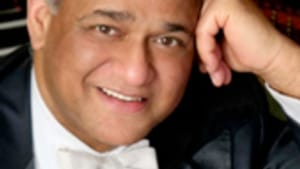Stay in the Loop
BSR publishes on a weekly schedule, with an email newsletter every Wednesday and Thursday morning. There’s no paywall, and subscribing is always free.
A former child prodigy's brilliant autumn
Andre Watts Plays Schubert and Liszt

Like so much of today's increasingly trivialized vocabulary, the word "great" has lost much of its power. We have great beers, a Great America theme park and a haircut chain called Great Clips. But when we speak of a "great composer" or a "great performer," we ought to mean music that's profound and transformative— that sets a new standard beyond mere popularity and worldly success.
On the rare occasions when greatness emerges— Horowitz's first American performances of Rachmaninoff's Third Piano Concerto, say, or the moments of creation of Beethoven's Grosse Fugue— the moment must be treasured.
A case in point is this month's Andre Watts piano recital at Verizon Hall. On an otherwise dreary Sunday afternoon, Watts lit up the musical world with stellar performances of piano works by two stylistically different composers whose paths briefly overlapped: Schubert and Liszt. For me, Watts's performance and the similarities and differences between Liszt's and Schubert's compositions raised the question of what makes for true "greatness" in music.
As to the performance: Watts— who studied at the old Philadelphia Music Academy, about a block from the present site of the Kimmel and grew up as a TV prodigy who played with Leonard Bernstein and the New York Philharmonic— was long familiar to me and most Philadelphians as one of his generation's outstanding concert pianists. But neither I nor probably Sunday's audience was prepared for the stunning pyrotechnics with which he executed the Liszt Sonata in B minor and the Schubert Fantasie in C Major, both of which push the limits of any pianist in terms of speed, dynamics, and musical complexity.
Stunning pyrotechnics
Still, had he provided pyrotechnics alone, the term "greatness" wouldn't have applied to his performance. It was his precision, his disciplined use of his whole musculoskeletal system to reveal the fortissimo passages in their full glory, and his concentrated attention to each and every note and passage— a trademark of his mentor, Leon Fleisher— that reinforced my sense a truly great and memorable performance seemed to be in the making.
Yet even that power and focus, however "awesome" (another term which has become devalued by overuse in our culture), doesn't qualify for true greatness in the sense defined above. Above all was the fact that Watts, in the midst of executing one after another difficult passage, was not only faithful to the composers' intent, but also exposed the meaning of the music to the point where it was enlightening to the listener.
For instance, it became clear in Watts's interpretation of Un Sospiro how Liszt's melodic beauty set the stage for Tchaikovsky and Rachmaninoff and subsequently Barber in particular, and how the later extensions of Romanticism would have been impossible without Liszt— Wagner, Brahms, and Dvorak notwithstanding. Watts showed how Liszt was able to "sing" with the piano, in contrast to interpretations that make Liszt appear histrionic. It was, as Watts amply illustrated, Liszt's extraordinary expansion of melodic range that the later Romantics made a keystone of their music.
Parallels revealed
In his performance of the very difficult Liszt Sonata in B minor, Watts"“ whether intentionally or not"“ revealed its extraordinary parallels to the Rachmaninoff Third Concerto (dubbed the "Rack Three" on account of its extreme technical challenges), including the parallel difficulties involved in performance. (It's said that Liszt, whom some considered the greatest pianist of his time, wished to equal Paganini's violin virtuosity on the piano.)
In this Sonata, Liszt also followed the final movement of Beethoven's Ninth Symphony by using the sonata form within a single movement. But he did more than that: He used form in a very modern way, as a means of expression. Like the Chinese puzzle boxes within boxes, the Sonata in B Minor negotiates through puzzling shifts of thematic and harmonic development that nevertheless "tell a story." Watts was able to bring out the modern, even postmodern aesthetics of Liszt's use of form, above and beyond the "sorcery" attributed to it by befuddled scholars.
What Liszt lacked
Schubert, of course, has already been labeled "great" by general consensus. He wrote some of the "greatest" song cycles and chamber music in the repertoire and embodied the ideals of Haydn and Mozart while moving their music to new levels of complexity and expression.
But Liszt, however brilliant and innovative he may have been, always seemed to be missing something that Schubert possessed many times over— namely, the right and consistent sentiment. Watts's superb performance convinced me that Liszt could have achieved what the truly "great" composers did had he reined in his excessive ambition, for Watts brought out a depth in Liszt that few performers have accomplished.
A musician who makes a composer's full power and intention shine through truly deserves to be called "great." Indeed, the sun shone between the clouds as I walked home that afternoon, and I felt humbled and grateful for having attended a rare and memorable concert by a true master of his instrument.♦
To read a response, click here.
On the rare occasions when greatness emerges— Horowitz's first American performances of Rachmaninoff's Third Piano Concerto, say, or the moments of creation of Beethoven's Grosse Fugue— the moment must be treasured.
A case in point is this month's Andre Watts piano recital at Verizon Hall. On an otherwise dreary Sunday afternoon, Watts lit up the musical world with stellar performances of piano works by two stylistically different composers whose paths briefly overlapped: Schubert and Liszt. For me, Watts's performance and the similarities and differences between Liszt's and Schubert's compositions raised the question of what makes for true "greatness" in music.
As to the performance: Watts— who studied at the old Philadelphia Music Academy, about a block from the present site of the Kimmel and grew up as a TV prodigy who played with Leonard Bernstein and the New York Philharmonic— was long familiar to me and most Philadelphians as one of his generation's outstanding concert pianists. But neither I nor probably Sunday's audience was prepared for the stunning pyrotechnics with which he executed the Liszt Sonata in B minor and the Schubert Fantasie in C Major, both of which push the limits of any pianist in terms of speed, dynamics, and musical complexity.
Stunning pyrotechnics
Still, had he provided pyrotechnics alone, the term "greatness" wouldn't have applied to his performance. It was his precision, his disciplined use of his whole musculoskeletal system to reveal the fortissimo passages in their full glory, and his concentrated attention to each and every note and passage— a trademark of his mentor, Leon Fleisher— that reinforced my sense a truly great and memorable performance seemed to be in the making.
Yet even that power and focus, however "awesome" (another term which has become devalued by overuse in our culture), doesn't qualify for true greatness in the sense defined above. Above all was the fact that Watts, in the midst of executing one after another difficult passage, was not only faithful to the composers' intent, but also exposed the meaning of the music to the point where it was enlightening to the listener.
For instance, it became clear in Watts's interpretation of Un Sospiro how Liszt's melodic beauty set the stage for Tchaikovsky and Rachmaninoff and subsequently Barber in particular, and how the later extensions of Romanticism would have been impossible without Liszt— Wagner, Brahms, and Dvorak notwithstanding. Watts showed how Liszt was able to "sing" with the piano, in contrast to interpretations that make Liszt appear histrionic. It was, as Watts amply illustrated, Liszt's extraordinary expansion of melodic range that the later Romantics made a keystone of their music.
Parallels revealed
In his performance of the very difficult Liszt Sonata in B minor, Watts"“ whether intentionally or not"“ revealed its extraordinary parallels to the Rachmaninoff Third Concerto (dubbed the "Rack Three" on account of its extreme technical challenges), including the parallel difficulties involved in performance. (It's said that Liszt, whom some considered the greatest pianist of his time, wished to equal Paganini's violin virtuosity on the piano.)
In this Sonata, Liszt also followed the final movement of Beethoven's Ninth Symphony by using the sonata form within a single movement. But he did more than that: He used form in a very modern way, as a means of expression. Like the Chinese puzzle boxes within boxes, the Sonata in B Minor negotiates through puzzling shifts of thematic and harmonic development that nevertheless "tell a story." Watts was able to bring out the modern, even postmodern aesthetics of Liszt's use of form, above and beyond the "sorcery" attributed to it by befuddled scholars.
What Liszt lacked
Schubert, of course, has already been labeled "great" by general consensus. He wrote some of the "greatest" song cycles and chamber music in the repertoire and embodied the ideals of Haydn and Mozart while moving their music to new levels of complexity and expression.
But Liszt, however brilliant and innovative he may have been, always seemed to be missing something that Schubert possessed many times over— namely, the right and consistent sentiment. Watts's superb performance convinced me that Liszt could have achieved what the truly "great" composers did had he reined in his excessive ambition, for Watts brought out a depth in Liszt that few performers have accomplished.
A musician who makes a composer's full power and intention shine through truly deserves to be called "great." Indeed, the sun shone between the clouds as I walked home that afternoon, and I felt humbled and grateful for having attended a rare and memorable concert by a true master of his instrument.♦
To read a response, click here.
What, When, Where
Andre Watts: piano recital. Works by Schubert and Liszt. November 1, 2009 at Verizon Hall, Kimmel Center. (215) 893-1999 or www.kimmelcenter.org.
Sign up for our newsletter
All of the week's new articles, all in one place. Sign up for the free weekly BSR newsletters, and don't miss a conversation.
 Victor L. Schermer
Victor L. Schermer